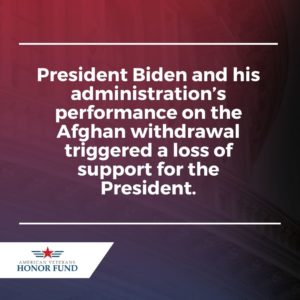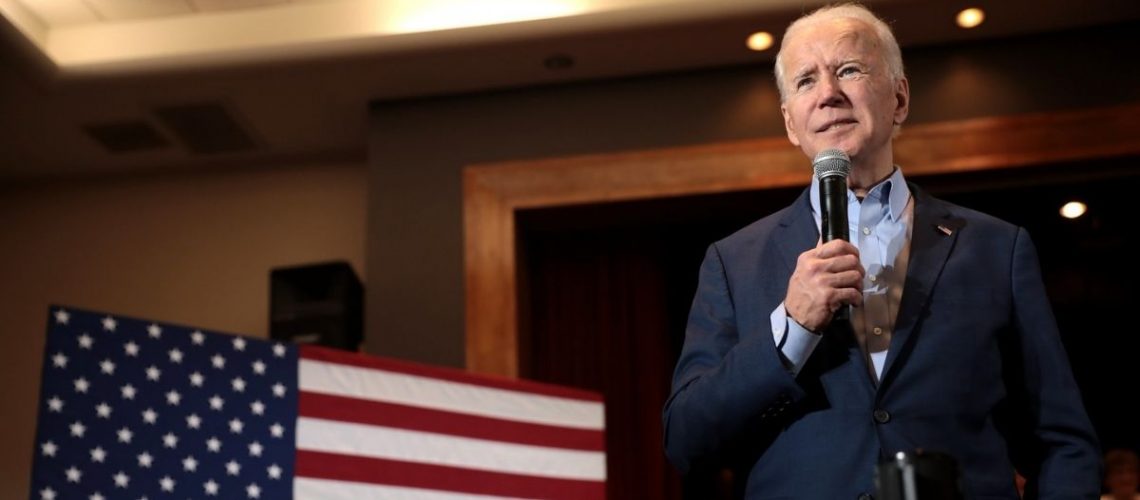President Joe Biden’s withdrawal from Afghanistan resulted in the catastrophically botched execution of a policy that most Americans supported. Yet the nation was stunned by how it was done, with the carnage taking the lives of over a dozen US forces and dozens of locals. As a result, Joe Biden’s approval amongst Americans, including Veterans, began to decline.
President Biden and his administration’s performance on the Afghan withdrawal triggered a loss of support for the President which continues into the second year of his administration. But Veterans as a voting bloc have not supported Joe Biden as strongly as the public from the start, and the Afghanistan debacle has highlighted their doubts in his abilities.
Afghanistan Withdrawal
The failed withdrawal rubbed salt on decades of sacrifice for a war that many Veterans did not think was worth fighting. A 2019 Pew poll revealed that, “majorities of both veterans (58%) and the public (59%) say the war in Afghanistan was not worth fighting. About four-in-ten or fewer say it was worth fighting.” Veterans understand that the use of force must be used wisely, and in retrospect, Americans in general felt disillusioned with both the Afghan and Iraq wars.
It is logical then, that a majority of Veterans would approve of the decision to withdraw. From Pew in September: “In a survey conducted Aug. 23-29 – before all American troops had left Afghanistan – 52% of military veterans said the U.S. decision to withdraw troops from the country was the right one…” Support for the execution, however, was another story.

Veterans Felt Betrayed
Biden’s execution of the Afghan withdrawal left many Veterans with a feeling of betrayal, humiliation, disappointment, and others, reported Defense One in November. The publication noted a poll conducted by non-profit, More in Common US, in which “70 percent of those polled do not feel like the U.S. departed Afghanistan with honor…” Anecdotal stories note many Veterans’ distress with how Biden’s Administration withdrew.
Former Naval officer, and liaison officer in Afghanistan, James Seddon, told NPR: “A few times, I felt physically dizzy.”
Another Afghan War Veteran, Jason Lilley, said “I personally, individually, think this was a complete waste of time,” after watching the withdrawal unfold.
Ultimately, if President Biden was looking to shore up support from our nation’s Vets, Afghanistan ended up having the opposite effect. Morning Consult reported in September that Joe Biden had the lowest approval of Vets on Afghan foreign policy than his three predecessors since the war began, with 47% of Veterans who served in Afghanistan disapproving (4% didn’t have an opinion). And as many as 93% of Veteran respondents in another poll stated that “the withdrawal did not respect those who served and gave their lives in the conflict,” reports The New Mexico Sun.
Perhaps Joe Biden’s general lack of support from Veterans ties into their tendency to vote for Republican candidates. In an August poll from Public Policy Polling, 54% of Veterans polled stated that they voted for former President (and Republican) Donald Trump. While Biden continues to struggle in the polls with the public, his handling of foreign policy will certainly play a role in how he recovers. His administration’s response to the Ukraine/Russia crisis may provide a strongpoint if he continues to keep US involvement to a minimum.
A recent poll conducted by Concerned Veterans for America found that “49% of the general population, 60% of veterans, and 52% of military families” oppose any war with Russia. If President Biden navigates this conflict successfully, he may just win back some of the Veteran support he has lost after Afghanistan.


